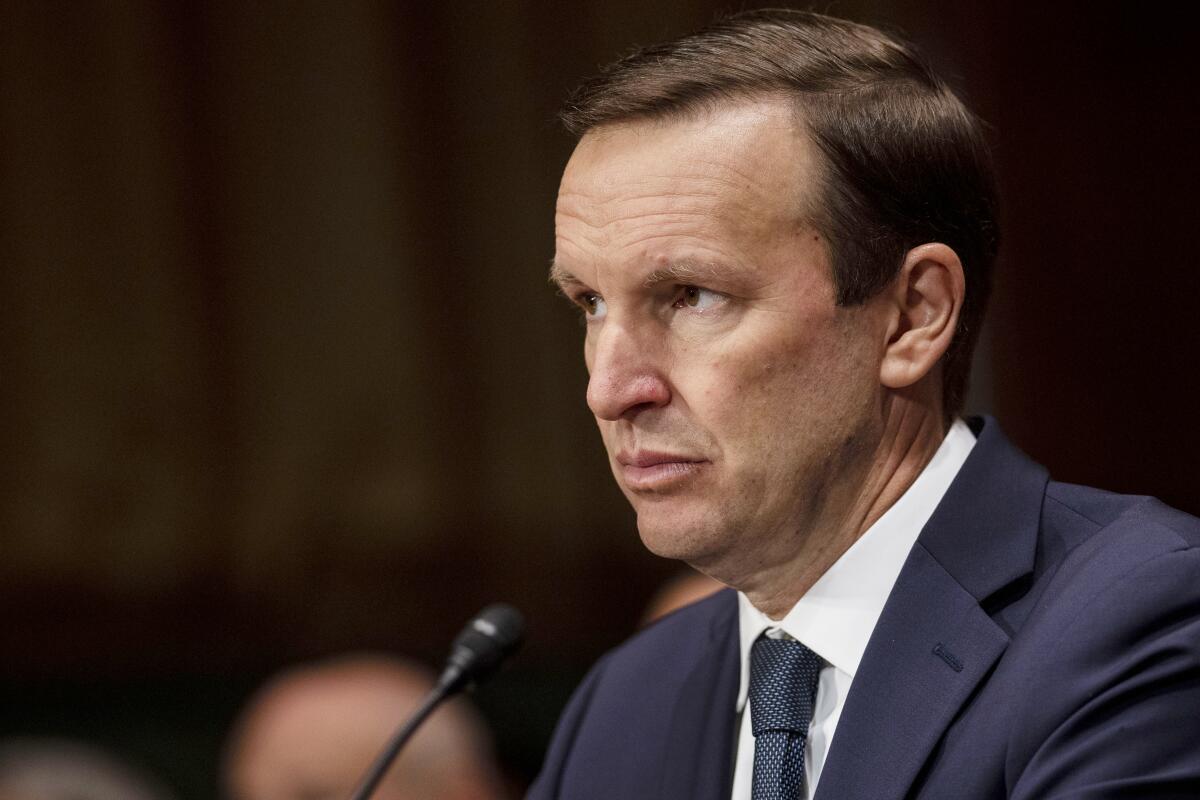Key Senate Democrats say they will preserve funding for gun violence research

- Share via
WASHINGTON — Senate Democrats are confident they can preserve funding for gun violence research, a field that California scientists have long dominated, Sens. Christopher S. Murphy (D-Conn.) and Chris Van Hollen (D-Md.) tell The Times.
House Republicans have proposed a government spending bill that would gut funding aimed at better understanding the causes and impacts of gun violence, which kills tens of thousands of Americans each year.
The money is a tiny fraction of an omnibus spending bill that last year totaled $1.7 trillion, but it was only secured in 2019 over the objections of gun-rights activists.
Advocates for gun violence research funding had worried that Republicans would target the funding. “It’s going to be a fierce battle,” Mark Rosenberg, a former Centers for Disease Control and Prevention official who oversaw early efforts to research gun violence in the 1990s, warned The Times in June.
But Van Hollen, a former member of House Democratic leadership who was elected to the Senate in 2016, and Murphy, perhaps Democrats’ most vocal proponent of gun control, say they aren’t particularly worried.
“What you’re witnessing in the House is the extreme right-wingers trying to do the bidding of the gun industry,” Van Hollen said. “We know that gun violence research can save lives, and we know that the gun industry is focused on protecting profits. We have a battle here, but I’m confident that the Senate position will prevail.”
Murphy agreed.
A long-time advocate for research into gun violence, Murphy said that bills coming out of the House “are not serious efforts at legislating.”
“The House process is all about preserving Kevin McCarthy’s speakership,” Murphy said. “He knows these bills have no chance of passing… ultimately, that money is going to be in the final bill we pass.”
Reviewing the proposed budget for the CDC in the spring, Rep. Robert Aderholt (R-Ala.), who chairs the House appropriations subcommittee that controls gun violence prevention research funding, described the funding as “controversial.”
“Are these kind of activities in the same category as combating chronic diseases threatening our most vulnerable population or reducing antibody resistance?” Aderholt asked, referring to a handful of programs including firearm research. “I would argue that they are much different, and that we should focus our CDC resources on infectious diseases, transmittable diseases, and certainly chronic diseases, rather than controversial, political-charged activities.”
In recent years, advocates have touted bipartisan support for the funding.
Arkansas Rep. Jay Dickey, a fierce defender of gun rights, had secured an amendment in 1996 that blocked any federal money from funding studies of gun violence.
Rosenberg and Dickey sparred over the issue of gun violence research. But eventually, they struck up an unlikely friendship. They bonded over an agreement that research into firearms could be apolitical.
The press cited their friendship as an example that the government could look into gun violence without entering America’s culture wars. In 2015, Dickey said publicly that he supported funding for gun violence research. At Dickey’s 2017 funeral in Pine Bluff, Ark., Rosenberg delivered the eulogy.
Just a few years later, right-wing Republicans in the House are trying to gut the funding and Senate Democrats are slamming the GOP’s ability to legislate “seriously.” The issue could hardly feel more political.
In those five years, the CDC and NIH have funded dozens of studies on gun violence research that had been prohibited in the past. States have received funding to explore gun violence through real-time data from emergency rooms. Just this year, a study out of UC Davis found that mass and active shooters in California have distinct gun purchasing patterns. And last summer, Congress passed its first sweeping gun safety legislation in years.
But the five years have also brought high-profile mass shootings and spiking rates of firearm deaths.
In a hallway interview last month, Rep. Rosa DeLauro (D-Conn.), who helped secure funding on the House side five years ago, appeared uncertain about its future. She suggested that how the House acts on gun violence research is up to Republicans.
Many Democrats hold that Republicans in the House are captive to the GOP’s most right-wing members, and that spending bills filled with extreme provisions don’t stand a chance at the negotiating table. But the right wing of the party has won a string of victories over the last months – most recently a handful of amendments to defense legislation that would ban the military from reimbursing service members who travel to obtain abortions and block them from funding gender-affirming care.
Most Democrats would be unlikely to vote for a standalone bill that included drastic cuts to gun violence research. But the bills coming out of the House have a slew of controversial elements, including major cuts to public education funding. And the two parties may need to find a middle ground.
GOP hard-liners will continue to push for their version of the spending bill. McCarthy will have to decide whether to break away from them when it comes time to negotiate with Senate Democrats. A stalemate could shut down the federal government.
Supporters of gun violence research have winced at the House proposal, labeling it a “tremendous step backward” in the effort to understand the issue.
“The appropriations bills in the House are the gun lobby’s dream, and a complete disaster for public safety,” said Rob Wilcox, senior director of federal government affairs at Everytown for Gun Safety. “We’ve been funding important gun violence research on a bipartisan basis for years.”
More to Read
Get the L.A. Times Politics newsletter
Deeply reported insights into legislation, politics and policy from Sacramento, Washington and beyond. In your inbox three times per week.
You may occasionally receive promotional content from the Los Angeles Times.











